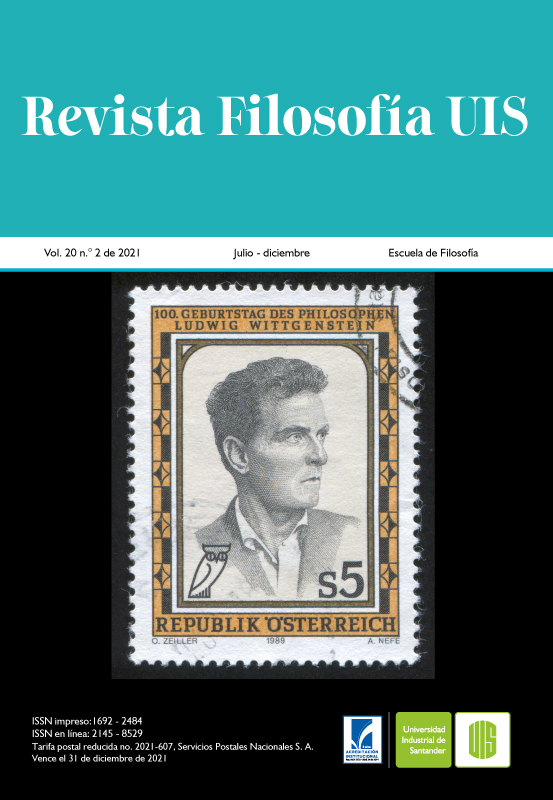What are Metalanguages for? On Interdisciplinarity, Literary Translation and the Role of the Humanities
Published 2021-06-11
Keywords
- language,
- metalanguage,
- translation,
- interdisciplinary work,
- education
- Borges,
- Heidegger,
- Wittgenstein ...More
How to Cite
Copyright (c) 2021 Revista Filosofía UIS

This work is licensed under a Creative Commons Attribution 4.0 International License.
Abstract
Metalanguages —that is, those that are about other languages— have some interesting properties: in the effort to create second-order languages —such as bridge languages between two mother tongues or between two disciplines— the way in which particular languages approach the world, and their particular materiality and historicity, is foregrounded. This point of view helps us understand the inherent difficulties in both interdisciplinary cooperation and literary translation. An important aspect of work in the humanities is the creation of metalanguages in the context of what Heidgger calls “disclosing”, that is, the constituting of the world according to a certain ontology —which carries a certain ethical weight, in that it profoundly impacts the way of life of a community that discloses in this or that manner—. If the role of the humanities towards human languages is understood, their role and educational importance becomes clear, the humanities facilitate dialogue between disciplines, and between worldviews, and they empower individuals and communities to articulate new ways of disclosing, new ways of answering the age-old philosophical question: how are we to live?
Downloads
References
- Aristóteles (2001). Ética a Nicómaco. Alianza Editorial.
- Austin, J. L. (1991). Quand dire ce faire. Points.
- Beer, S. (1995). Brain of the Firm. Wiley.
- Beer, S. (1999). “On the Nature of Models: Let us Now Praise Famous Men and Women, Too (from Warren McCulloch to Candace Pert). Informing Science: The International Journal of an Emerging Transdiscipline, 2(3), 69-82.
- Benjamin, W. (2001). La tarea del traductor. En H. A. Murena (Comp. y trad.), Ensayos escogidos (pp. 77-88). Coyoacán.
- Bowker, G. (1993). How to Be Universal: Some Cybernetic Strategies. Social Studies of Science, 23(1). 107-127.
- Borges, J. L. (2001). La música de las palabras y la traducción. En C-A. Mihailescu (Ed.) y J. Navarro (Trad.) Arte poética. Seis conferencias (pp. 75-95). Crítica.
- Bula, G. (2010a). Las conexiones ocultas. Polis, 9(25). https://journals.openedition.org/polis/294
- Bula, G. (2010b). Cinco habilidades para el siglo XXI. Sustentabilidad(es), 1(1), 14-31. http://www.sustentabilidades.usach.cl/sites/sustentable/files/paginas/02.pdf
- Bula, G. (2015). Towards a non-trivializing education. Kybernetes 44(6-7), 913-925. https://doi.org/10.1108/K-11-2014-0254
- Bula, G. (2017). Spinoza: Educación para el Cambio. Universidad de La Salle - Aula de Humanidades.
- Bula, G. (2020). Las Apologías, Las Nubes y el juicio de Sócrates: identidad y cambio en los sistemas viables. Revista Filosofía UIS, 19(1), https://doi.org/10.18273/revfil.v19n1-2020002
- Bula, G. & Garavito, M. C. (2013). Innerarity and Immunology: Difference and Identity in selves, bodies and communities. Journal of Arts and Humanities 2(2). 9-16.
- Deleuze, G. (2004). Spinoza: Filosofía práctica. TusQuets.
- Dörner, D. & Funke, J. (2017). Complex Problem Solving: What it is and what it is not. Frontiers in Psychology, 8, 1153-1160. https://doi.org/10.3389/fpsyg.2017.01153
- Fitzgerald, E. (2016). Edward Fitzgerald’s Rubaiyat of Omar Khayyam. Bloomsbury.
- Giroux, H. (1986). Teorías de la reproducción y la resistencia en la nueva sociología de la educación: un análisis crítico. Revista Colombiana de Educación, 17(1). https://doi.org/10.17227/01203916.5140
- Giroux, H. (1990). Los profesores como intelectuales. Hacia una pedagogía crítica del aprendizaje. (I. Arias, trad.). Paidós/M.E.C
- Heidegger, M. (2007). La pregunta por la técnica. Folio.
- Heidegger, M. (2013). Carta sobre el humanismo. Alianza Editorial.
- Kuhn, T. S. (1996). The structure of scientific revolutions. University of Chicago. Informing Science, 2(3), 69-82.
- Lasa, C. D. (2016). El conocimiento filosófico y una historia de amenaza. Cuadernos Universitarios. 9, 1-13. http://revistas.ucasal.edu.ar/index.php/CU/article/view/49
- Loureda, O. (2009). De la función metalingüística al metalenguaje: los estudios sobre el metalenguaje en la lingüística actual. Revista Signos, 42(71), 317-332.
- Mashhady, H. (2012). Fitzgerald’s Approach to Translation. International Journal of Scientific & Engineering Research, 3(4). https://www.ijser.org/researchpaper/FitzGeralds-Approach-to-Translation.pdf
- Nussbaum, M. (2010). Sin fines de lucro. Por qué la democracia necesita de las humanidades. (M. V. Rodil, trad.). Katz Editores.
- Nuñez, R. & Sweetser, E. (2006). With the Future Behind Them: Convergent Evidence From Aymara Language and Gesture in the Crosslinguistic Comparison of Spatial Construals of Time. Cognitive Science, 30, 401-450.
- Searle, J. (1997). La construcción de la realidad social. Paidós.
- Sen, A. (2001). Sobre ética y economía. Alianza Editorial.
- Simondon, G. (2009). La individuación a la luz de las nociones de forma y de información. La Cebra/Cactus.
- Spinosa, C., Flores, F., & Dreyfus, H. (1997). Disclosing New Worlds. MIT press.
- Verdugo-Torres, L. A. (2020). Lenguaje e historia mesiánica en Walter Benjamin. En Rodríguez, H. (Ed.), Contingencias del lenguaje (pp. 111-132). Unversidad de La Salle.
- Wittgenstein, L. (1994). Tractatus Logico-Philosophicus. Altaya.
- Wittgenstein, L. (2009). Los cuadernos azul y marrón. Tecnos.
